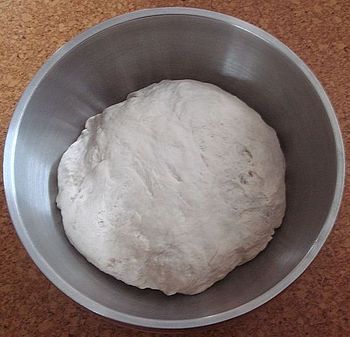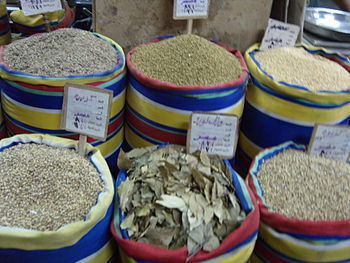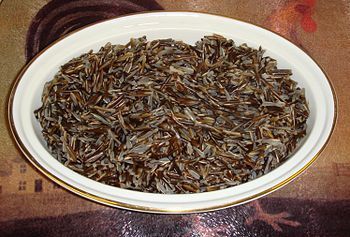Mike Angarola's Blog, page 5
May 24, 2014
Mango Bean Wraps
It seems like everyone is jumping on the Mango bandwagon theses days and with good reason. Mangoes are a sweet, tasty and healthy fruit that adds a little diversity into your diet. The internet is full of recipes using fresh … Continue reading →
The post Mango Bean Wraps appeared first on Gracie's Ravioli.

May 7, 2014
Seafood is a Sicilian Legacy
My grandparents, who lived downstairs from us, where both from Sicily and could have eaten fish every night of the week. Seafood is definitely a Sicilian legacy and one which I continue to enjoy to this day. My grandfather worked … Continue reading →
The post Seafood is a Sicilian Legacy appeared first on Gracie's Ravioli.

April 26, 2014
Make Your Saturday Breakfast Special with Ricotta Pancakes
Every once in a blue moon on a Saturday morning, my mom would do something special and make Ricotta Pancakes. She really didn’t fancy using ricotta cheese for breakfast, but when she did, no one ever slept in. There is … Continue reading →
The post Make Your Saturday Breakfast Special with Ricotta Pancakes appeared first on Gracie's Ravioli.

April 20, 2014
Italian Wheat Pie
A big tradition for my mom at Easter was to make her traditional Italian Wheat Pie. Super sweet and loaded with Ricotta cheese, this pie was always a huge hit. I love Italian Wheat Pie. Of all the great dishes … Continue reading →
The post Italian Wheat Pie appeared first on Gracie's Ravioli.

April 14, 2014
What is the Meaning of a “Ragoút”
It seems that recently I have been seeing the term ragoút when defining a recipe selection. Now I consider myself a fairly seasoned Kitchen Chef, but have to admit a bit of ignorance behind the meaning of ragoút. I took … Continue reading →
The post What is the Meaning of a “Ragoút” appeared first on Gracie's Ravioli.

April 8, 2014
3 Simple Ways to Spring into Artichokes
Gracie loved artichokes and years ago the only time of year you could find them in the marketplace was early Spring. She had her favorite way of preparing them but I’ve come up with three more. Mom always stuffed her … Continue reading →
The post 3 Simple Ways to Spring into Artichokes appeared first on Gracie's Ravioli.

March 29, 2014
Cannellini Bean Recipe

March 19, 2014
Feast of Saint Joseph
Last year I shared with you my mom’s tradition of baking bread and delivering it to neighbors on the Feast of Saint Joseph the Carpenter. Sicilians and other Southern Italians celebrate this Saint’s day every March 19th.
I was browsing on my post from last year and realized that I shared with you mom’s recipe for St. Joseph’s Soup but not the bread, which was really the centerpiece of the day.Click Here to revisit the post from last year and read on for the bread recipe.
St. Joseph’s Day Bread
Ingredients:
1 1/2 cups of warm water
2 packages of dry yeast
2 Tbsp. of shortening
1 Tbsp. sugar
1 Tbsp. oil
2 tsp. salt
1Tbsp. Anise seeds
4 1/2 cups flour
1 egg slightly beaten
Preparation:
Combine in a bowl the warm water, yeast, shortening, sugar, oil, anise seeds and salt. Let this sit for 5 minutes.
In a mixing bowl put 2 1/2 cups of flour and add the yeast mixture. Beat together

Yeast bread dough, ready for proving (Photo credit: Wikipedia)
until all ingredients are completely blended. Stir in enough of the remaining flour to form a dough. Turn dough onto a floured board. Knead in more of the flour to form a stiff and smooth dough. Shape it into a ball. Place it in a greased bowl, cover and let it rise in a warm draft free location until dough doubles in size.
Punch dough down and divide the dough into 6 equal pieces. Cover and let the dough rest for 10 minutes. Roll each piece of dough into a 12 inch long rope. Take 3 of the ropes and braid together to form a long braid, you will get 2 loafs of bread. Place on a greased baking sheet, cover and let rise in a warm draft free location until double in size.
Brush top with beaten egg ans sprinkle some additional anise seeds over the top of the bread. Bake in a preheated 400 degree oven for 25 minutes or until golden brown. Remove from cooking sheets and cool on wire racks
Related articles
 Feast of Saint Joseph
Feast of Saint Joseph Happy St. Joseph Day 2014
Happy St. Joseph Day 2014 Happy St. Joseph Day 2014
Happy St. Joseph Day 2014 Happy Feast Day of Saint Joseph
Happy Feast Day of Saint Joseph



March 16, 2014
A World of Seasoning
With a little practice, you can create an endless variety of delicious recipes, such as Mediterranean-inspired favorites bursting with the fresh flavors of lemon, garlic and rosemary and spicy Mexican dishes featuring cilantro, cumin and chili powder. The flavor in herbs and spices are also great alternatives to salt.
Of course, your options won’t end there. A wide range of herbs, spices and seasonings are

English: Spices in Mapusa Market, Goa, India. (Photo credit: Wikipedia)
used throughout the world to make food taste better, and in some cases, last longer. Over time, certain flavors have come to represent the culinary identity of the areas where they originated. In large part, the seasonings you choose will define the direction of your own culinary development, as well.
With a little creativity, you can put a fresh spin on some of your favorite tried-and-true recipes by simply swapping out the herbs, spices and seasonings you use. For example, if you add fresh or dried basil or oregano to diced tomatoes, chopped onion and finely minced garlic, you have the makings of a wonderful red Italian sauce. On the other hand, if you replace the basil and oregano with cilantro and lime juice, those same ingredients become the foundation for a fabulous homemade salsa recipe.
To help inspire you, the following chart shows some of the most popular culinary ingredients based on geographic region.

Spices and herbs on a local market in Cairo, Egypt (Photo credit: Wikipedia)
Cuisine: Popular Herbs, Spices & Seasonings
Italian:
basil, oregano, marjoram, rosemary, parsley
French:
thyme, French tarragon, rosemary, basil, sage, mint, marjoram
Greek:
dill, lemon, oregano, fennel
Spanish:
saffron, smoked and regular paprika, rosemary, thyme
German:
mustard, rye, caraway seeds, borage
Mexican:
cilantro, chili powder, cumin, Mexican oregano
Indian:
curry powder, coriander, cumin, turmeric
Chinese:
five-spice powder, star anise, fennel seed, cloves, cinnamon, ginger
Thai:
Thai basil, cumin, turmeric, lemon grass, cinnamon
Of course, this chart is far from comprehensive, but it can serve as a good reference point for assembling your own collection of must-have herbs, spices and seasonings.
Keep in mind, some herbs, spices and seasonings, such as salt, black pepper and garlic, have an almost universal appeal that isn’t limited by geographic borders. Chances are you will notice those items popping up in recipes from all over the world. As a result, you may want to keep an adequate supply of these basic ingredients in your own pantry or spice rack.
You will also see a lot of crossover among dishes from countries that border one another. For example, French, Italian, Greek and Spanish dishes often feature many of the same herbs, such as basil, rosemary, oregano and thyme. Of course, this isn’t surprising when you consider how these populations interacted with and melded together over the course of history. Depending on your personal tastes and cooking habits, these ingredients may be good to keep on hand, as well.
Have you ever considered fresh herbs? Fresh herbs are super easy to grow from seed or

Herbs (Photo credit: Angela de Março)
from cuttings in your own garden and many can be brought indoors for year-round enjoyment. However, if growing fresh herbs isn’t your thing, many popular fresh and dried varieties are readily available. Dried herbs can be a great alternative to fresh, but take note of expiration dates and suggested storage methods. Dried herbs, spices and seasonings can be quite expensive, so buy smaller amounts at one time if you won’t be using them often.
Homemade Taco Seasoning Mix
This recipe only takes a couple minutes to put together and costs less than buying pre-packaged taco seasoning. It also has less salt and no artificial additives or preservatives.
Ingredients:
2 tablespoons chili powder
1 tablespoon ground cumin
1 teaspoon ground coriander
2 teaspoons garlic powder
.5 teaspoon crushed red pepper flakes
1 teaspoon smoked paprika
1 teaspoon salt
2 teaspoon black pepper
Combine all ingredients in an airtight container and shake well to combine. Use 2 – 3 tablespoons per pound of ground beef (use more or less according to individual taste preferences).
This recipe can also be made in larger batches. Store unused amounts in an air tight container for up to 6 months.
Thanks To Tasting Taste for guest blogging on this post!
Related articles
 Herb Me Please
Herb Me Please ~ Chicken and Beef Shawarma Recipe ~
~ Chicken and Beef Shawarma Recipe ~ Spice up your life!
Spice up your life! How to Use Herbs in Cooking
How to Use Herbs in Cooking Plan Your Spring Vegetable Garden
Plan Your Spring Vegetable Garden Herb Resource Guide
Herb Resource Guide



March 14, 2014
Discover Wild Rice
Continuing with our March theme devoted to Rice let’s take a look at one variety that many don’t consider a rice at all. Read on as we discover ‘Wild Rice.’
Wild rice, or “manoomin,” an Ojibwe word roughly translated to mean “good seed,” is actually not rice at all, but is a grass. Native to lakes and rivers in North America, the seeds from this grass have been harvested since before written history of the region existed.
Most of the wild rice we see today is gathered by hand in the exact way it was centuries ago. Pushing a canoe or small boat through the wild rice patches on a lake, the tall grass is bent over the boat and struck with a stick to dislodge the ripe kernels. A team may return to the same wild rice patch in a few days to gather the kernels that have since ripened.
The distinctive color of wild rice will range from very dark charcoal to dark brown. This difference is due to the treatment during curing and the ripeness of the wild rice kernels when harvested. There is very little difference in the appearance or flavor of rice from lakes and rivers or farms.

Cooked wild rice. (Photo credit: Wikipedia)
Even though wild rice is typically priced higher than
other rice products, adding even a small amount to a rice dish is often enough
to make a real impact. With its nutty flavor and ‘toothy’ texture, wild rice
gives a delightful twist to any recipe, turning an ordinary rice dish into a
culinary adventure!
Below are a few Soup Recipes that incorporate wild rice. I hope you enjoy them!
Spiced Up Wild Rice Mushroom Chowder
2 tsp cooking oil
8 oz fresh mushrooms, sliced
1 stalk celery, chopped small
1/2 cup flour
4 cups vegetable broth or water
3 cups cooked wild rice
1 tsp sea salt
1/2 tsp curry powder
1/2 tsp dry mustard
dash allspice to taste
dash hot sauce to taste
1 1/2 to 2 cups half-n-half (or whole milk)
Put the oil in a large soup pot over medium heat, add mushrooms and celery and and cook, stirring, until softened and mushrooms slightly brown.
Turn heat down to medium-low.
While stirring, sprinkle flour over the mushrooms and celery and cook, stirring constantly, until flour turns golden, about 1 to 2 minutes.
Continue stirring and slowly pour in the vegetable broth or water; continue stirring and cooking until the broth thickens slightly.
Add the remaining ingredients, stirring to combine.
Turn heat to low, taste and adjust seasonings as you like.
DO NOT BOIL! Just heat until soup is hot, stirring frequently.
Remove from heat, cover pot and let stand for 3 or 4 minutes before serving. Ladle into soup bowls and add a dot of butter to each serving if you wish. A sprinkle of fresh parsley is also nice.
Will serve 2 to 4.
Wild Rice Cauliflower Soup
1 medium size onion, diced
1 cup finely chopped celery
1 cup Sliced fresh mushrooms
1/4 cup cooking oil
1 Tbsp butter
1/2 cup flour
1 quart chicken broth
2 cups COOKED wild rice
2 cups COOKED cauliflower pieces (bite size)
1 cup half-n-half or cream
In a soup pot over medium-low heat, add the onion, celery, and mushrooms along with the cooking oil and butter; cook until vegetables are softened.
With soup pot still over heat, sprinkle in the flour and stir until flour disappears, then continue stirring and slowly pour in the chicken broth, stirring constantly until soup thickens.
Now add in the wild rice, cauliflower, and cream and carefully stir until blended well. Cook just until heated through; do not allow to boil.
Serve immediately – Will serve 4 to 6.
Related articles
 A Taste on the Wild Side: Forbidden Rice
A Taste on the Wild Side: Forbidden Rice Wild Rice Stuffed Steaks
Wild Rice Stuffed Steaks Chicken and Ham Wild Rice Soup
Chicken and Ham Wild Rice Soup How To Cook Wild Rice on the Stovetop – Cooking Lessons from The Kitchn
How To Cook Wild Rice on the Stovetop – Cooking Lessons from The Kitchn Wild Rice Soup
Wild Rice Soup Blackened Mahi Mahi and Mango Salsa w/ Long Grain and Wild Rice and Sliced Carrots
Blackened Mahi Mahi and Mango Salsa w/ Long Grain and Wild Rice and Sliced Carrots

photo by:
Wisconsin Department of Natural Resources






